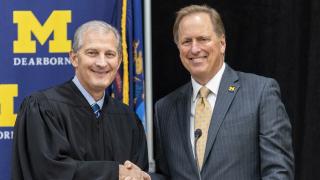
In a typical business ethics course, Assistant Professor of Management Studies Helet Botha says the greatest hits would include the ancient Greeks’ virtue ethics, German philosopher Immanuel Kant’s rule-based deontology, some version of consequentialism and the ethics of care — a system rooted in 20th-century feminism. One philosopher you likely wouldn’t encounter is Jean-Paul Sartre, the most prominent practitioner of French existentialism. And you almost certainly wouldn’t be reading Sartre’s existentialist contemporary Simone de Beauvoir, who frankly gets left out of more than a few philosophical conversations she deserves to be in. Botha suspects there are a few reasons why existentialism traditionally hasn’t been seen as all that relevant to business ethics — not the least of which is existentialism’s fundamental rejection of the idea that morality can be rooted in an objective, absolute source, like religion or reason. As a result, articulating a clear system for individuals to sort right from wrong, the common approach to doing ethics, wasn't a relevant project for existentialists. But that doesn’t mean that they weren’t interested in ethics, Botha says. In fact, Botha’s work focuses on showing that existentialism offers highly practical approaches for helping people navigate difficult ethical choices, including coping with the emotional burden they place on us.
Existentialism, particularly the brand that developed in France in the mid-20th century, was a highly influential philosophical approach that centered ethical life not around rules but on the agency that is involved in an individual living a meaningful life. Existentialists start from the idea that there is no universal, objective source for morality to guide one’s ethical decision making. Lacking this, a person simply has to choose what they think is best when facing a difficult ethical situation, and in that choice, they create their own moral code. Existentialist philosophers also spend a lot of time thinking about the burden this radical freedom places on people. If it’s on me to figure out what has value, that’s a lot of responsibility, and for existentialists, this responsibility is unavoidable. Still, people react to this responsibility in different ways. Some might be completely overwhelmed by this revelation and choose to deny it — a form of self-deception that existentialists call living in “bad faith.” Others might feel like it’s not even worth trying to act morally — a state of nihilism. Existentialists reject both of these paths. They think living in good faith requires embracing this responsibility, even if it’s uncomfortable. “Man is condemned to be free . . . because, once thrown into the world, he is responsible for everything he does,” Sartre writes in “Being and Nothingness.” As a result, it’s up to us to chart a meaningful path for our lives, including in the moral sphere.

Botha says thinking about ethics from this existentialist point of view can give us new tools for dealing with uncomfortable situations, including ones commonly encountered in a business and organizational ecosystem, which is Botha’s specialty. Take, for instance, a phenomenon known as “moral disengagement,” a frequently encountered situation where the discomfort over a moral dilemma tempts us to temporarily suspend the values we typically hold ourselves to. Botha gives an example involving a manager and an employee who has been late to work several times over the past few weeks, which the employee explains is due to unforeseen circumstances with her children. Based on communications from upper management, he tells the employee that her job may be at risk if she’s late again because it violates the tardiness policy. Several months later, when she is late again, the manager faces a dilemma — to fire or not fire the employee. It’s easy to imagine the manager’s discomfort. On the one hand, he may think that enforcing the policy is essential to treating everyone fairly. He may even anticipate consequences for himself if he doesn’t follow the guidance of his bosses. On the other hand, he feels sympathy toward the employee, especially given the circumstances. At this point, Botha says the manager may become overwhelmed by the choice in front of him and give into the temptation to “morally disengage”: He escapes his discomfort by telling himself that he really has no choice in the matter because he must follow the company’s rules and fire the employee. From an existentialist perspective, however, this is a classic example of living in bad faith, Botha says. One always has a choice. The manager pretending that he does not, though it may offer some degree of relief, amounts to an abdication of his fundamental moral agency. Further, even if the manager does rationalize his decision in this way, it’s easy to imagine he still feels some nagging sense of discomfort. The fact that his relief is not total — that he still feels some guilt about his decision — indicates that he knows that his choice has inflicted harm on the employee, which implies that he’s aware that he indeed had a choice.
Botha argues that understanding moral disengagement from this existentialist perspective also points to better ways of preventing it. Sartre contends, for example, that the fact that we are authors of our own moral code means that we are bound to experience guilt when we encounter situations that leave us feeling like we’ve failed to live up to that code. “He doesn’t say this in so many words, but if we riff off of him, there’s this idea that guilt should be normalized,” Botha says. “We are people completely enmeshed in commitments and relationships, and we are bound to drop the ball and not be able to tend to everybody all the time. You’ll be the bad guy in someone else’s story. He basically says, ‘accept that.’” Botha thinks there is virtue in the intellectual honesty that comes with this. But it’s also potentially beneficial: Anticipating that this kind of moral guilt will be an inevitable part of our lives may give us less reason to fear it, and thus less motivation to avoid it through moral disengagement.
Botha finds even more promise in Beauvoir’s existentialist ethics. Borrowing a phrase from philosopher Iris Murdoch, Botha says Sartre ultimately sees the individual as “ethically lonely.” For him, an exercise of one’s freedom is centered on what it means to the individual. For Beauvoir, however, the exercise of one’s freedom — and the satisfaction that comes from that — is deeply intertwined with other people’s freedom. In reality, our interests and projects often intersect and overlap with others’, and we often shape each other's interests and projects. For Beauvoir, we even need others to exercise their freedom in order for us to truly realize our own. Thus, we live in an “ambiguous” state of being both separate from and deeply connected to others. Botha says this departure from Sartre is particularly consequential when it comes to ethics. Revisiting the example involving the manager and the tardy employee, Sartre would likely be fine viewing this as a choice between fundamentally incompatible interests, and his mildly satisfying solution is to give us permission to feel bad about the impacts of our choice. Botha argues that Beauvoir’s ethics inspire us to question whether the interests of the manager, upper management and the employee are really so irreconcilable. The manager’s preference in the situation, after all, is not to harm or upset his own managers or his employee, hence his discomfort in choosing a path that does either. This indicates that he sees the exercise of his own freedom — his ability to choose the thing that feels good for him to do — as being tied to finding a solution in which all the interested parties also get to maintain their sense of agency. Thus, for Beauvoir, the discomfort of a sticky moral dilemma isn’t an invitation to give up through moral disengagement or a Sartrean acceptance of “dirty hands.” It’s an invitation to innovate. Perhaps, Botha says, the manager could try to persuade his higher-ups of the employee’s value to the team and why her circumstances demand more empathy. Maybe he could work with the employee on a flexible work schedule that allows her to fulfill her obligations to the company and her family. In seeing his own freedom as tied to others, he accepts the fullness of this responsibility and is motivated to work much harder to shape the situation. By doing so, he at least leaves open the possibility of creating a more desirable outcome for everyone, including himself.
Botha says Beauvoir’s ethical framework also offers a more robust protection against the temptations of moral disengagement. While Sartre’s normalization of guilt does, in theory, reduce the motivation to morally disengage, Beauvoir’s ethics, which see people’s interests and projects as entangled, gives us actual incentive to resolve situations through the creative use of our freedom. “Part of why dealing with an overwhelming situation through moral disengagement is bad is because there could have been another solution,” Botha explains. “You’ve given up an opportunity to do well by a variety of parties simultaneously. We want to avoid making premature tradeoffs between the different things we care about.” Further, Botha says there may be additional costs to abdicating our fundamental freedom to make choices or influence a situation. “There is, for example, a lot of work on how lacking a sense of agency leads to cynicism and, in turn, how cynicism affects health outcomes,” Botha says. “So we’re talking not just about unnecessary negative impacts of moral disengagement on others, but on the individual. We can even imagine how, at a societal level, if we do not believe that we have the capacity to act on our values, that’s pretty grim. If you see how often you could fail, it’s easy to think that some people might conclude it’s not even worth trying.”
Botha says examples like this demonstrate that existentialism is far from irrelevant to the world of business ethics. On the contrary, existentialism can give people working in organizational settings a whole new, highly relatable vocabulary for dealing with difficult moral situations — including for understanding and coping with the “overwhelm” these situations often trigger, which is something most other ethical systems don’t even address. She’d especially like to see Beauvoir’s ethics, which Botha sees as more developed and useful than Sartre’s, find a place in the canon. For many people, Sartre is existentialism. But Botha argues when it comes to ethics, “he needs to be augmented by her.” Today, both philosophers are still a long way from making the business ethics greatest hits list. In Botha’s classes, though, they’ve at least earned a place on the syllabus.
###
Story by Lou Blouin




